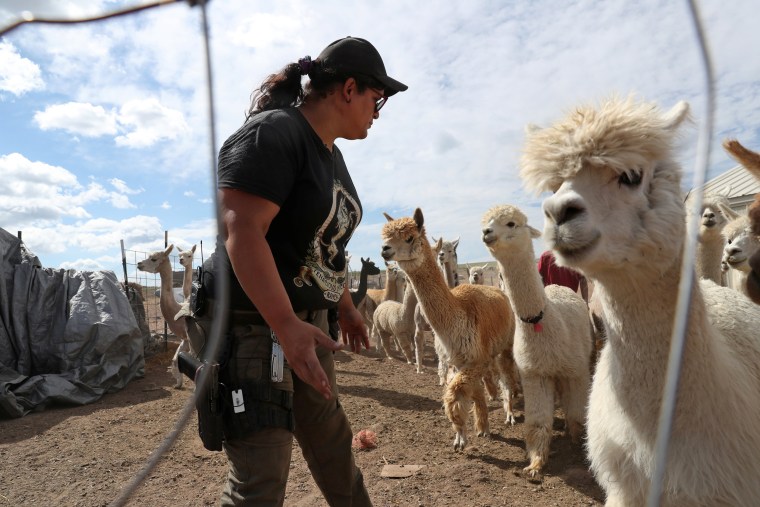“Bedtime, girls! Bedtime! Bedtime!” Penellope Logue yelled as she clapped her hands behind a herd of about 100 female alpacas.
It was about 9 a.m., so it wasn’t bedtime for the alpacas, but some of them understood the command to mean “Go into the barn,” where Logue and about a dozen volunteers were trying to corral them for their annual shearing.
This year, the shearing was a come-one, come-all event. Over the course of three days in late June, about 50 volunteers visited the Tenacious Unicorn Ranch in southern Colorado to help shear the alpacas. Logue, 40, founded the ranch in 2018 as a safe place for transgender people like herself, and she now co-owns it with Bonnie Nelson, 34.
Over the last two years, the ranch has received national recognition through more than a dozen news articles and has built an online reputation in the queer community as an armed, anarchist haven that shares cute photos of alpacas on Twitter, where it has more than 14,000 followers. Most of the volunteers who traveled to the ranch for the shearing were LGBTQ people who said they found it through social media.
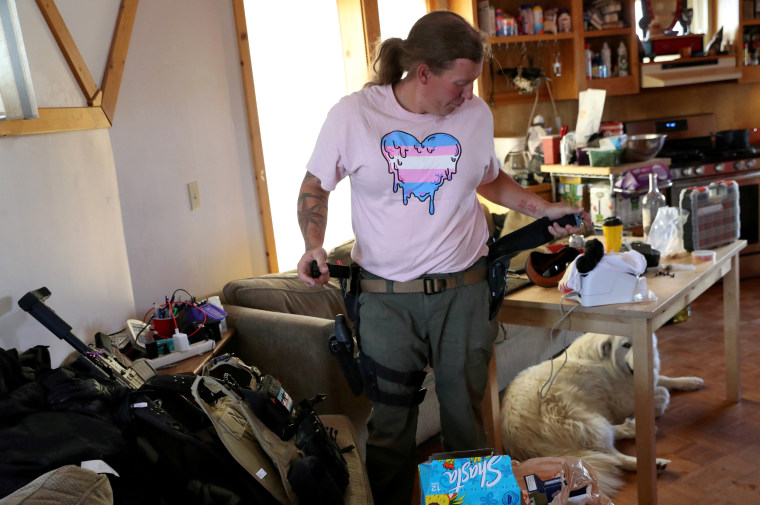
One alpaca at a time, the volunteers, ranch residents and a team of three Denver-based professional shearers clipped the fiber, as it’s called, off of nearly 170 alpacas. The fiber is processed at a local facility into yarn that is sold on Etsy every year to support the ranch, said Logue, who grew up on a farm in Longmont, Colorado, about 30 miles north of Denver.
During breaks from shearing, people gathered under a roughly 50-foot-wide red and yellow tent at the top of a hill near the shearing barn. Volunteers and ranch residents pulled up chairs in a circle — a “queer circle” as one resident called it, because it wasn’t perfectly round — to chat while a group of alpacas lingered next to the tent eating their hay. Some alpacas, like one female named Mocha, came up to Nelson and other volunteers for scratches.
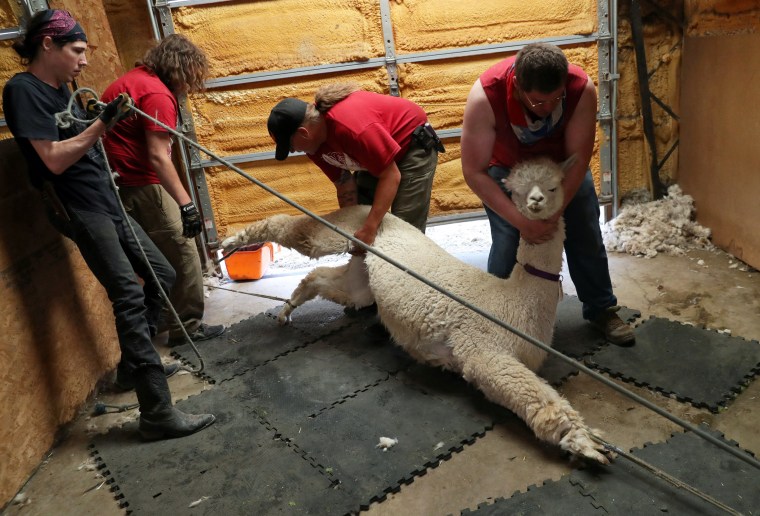
The co-owners said the event captured exactly why they founded the ranch in the first place: to create a place for queer people to gather and not just survive, but thrive.
“Walking up from shearing to a round circle of hyped up queer people is f------ awesome,” Logue said. “Everybody’s cackling and laughing. Everybody’s having a great time. That’s our ranch.”
“We created joy,” said Nelson, who moved from Long Island, New York, in August 2019. “It’s a wonderful feeling.”
It’s a feeling the ranch residents have fought for. In March, they faced online threats and harassment that culminated with two armed people trespassing on their land, Logue said. For about a month, a team of four volunteer guards conducted 24-hour patrols, but things have recently settled down. Now, they’re looking forward to expanding and helping other queer people replicate what they’ve created.
‘Queer people are done being stepped on’
The feeling of joy and safety that residents and volunteers say they feel on the ranch stands in contrast to what many trans people face everywhere else. So far this year, more than 30 states have considered at least 100 bills targeting transgender people, according to the Human Rights Campaign.
Nine states — eight since the start of the year — have passed laws banning trans girls from school sports, and two have banned or restricted trans minors’ access to medical care, according to the Movement Advancement Project, a nonprofit LGBTQ think tank. Six states have passed religious exemption laws that allow medical professionals to refuse to serve LGBTQ people.
This year is also on track to become the deadliest on record for transgender Americans, with at least 30 trans and gender-nonconforming people killed in the U.S. so far, according to the Human Rights Campaign. Advocates say this estimate is likely low, because law enforcement officials often misgender trans people and use their deadnames, their birth name they no longer use, in reports of their deaths.
That violence is part of the reason Logue and Nelson are well-armed. Both co-owners wear semi-automatic pistols strapped to their legs every day.
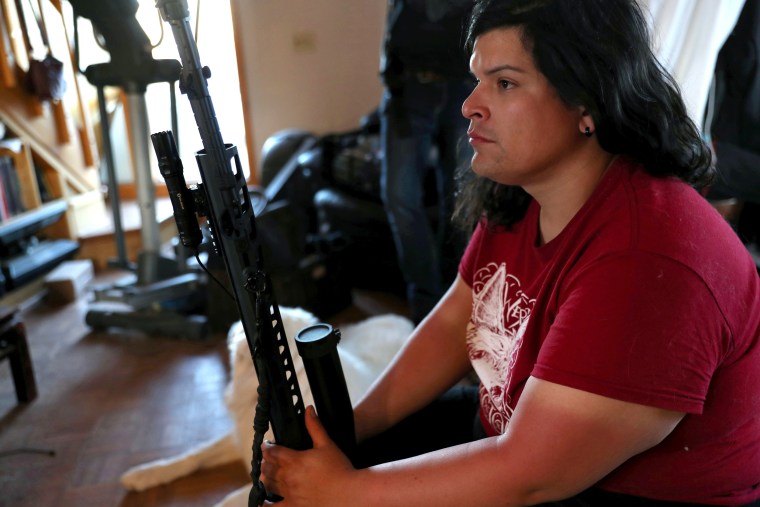
Nelson — who uses the pronouns ey, em and eir — said ey has watched the murder rate for trans people rise as the community has achieved more recognition and rights.
“You’ve got to fight back,” Nelson said. “I’m ready to kill people if they are threatening our lives.”
Logue added that she doesn’t want to kill anybody.
“That’s not why we’re here. We’re here to raise alpacas and see queer people thrive,” she said.
But she and Nelson said they will defend themselves if they have to — and they have. On March 1, after Denver’s 9News published an article about the ranch, Logue said she started receiving threatening messages, including death threats.
About 20 minutes away, in Westcliffe, Colorado, the closest town, Logue said people are largely supportive of the ranch, which has been involved in some community projects such as recycling efforts. The owner of Peregrine Coffee, a local coffee shop in the small town of less than 400, referred to Logue and Nelson as “the unicorns” and described them as good friends.
But Logue said there’s a small faction of local right-wing militia groups that haven’t liked them since they moved there. That all started to come to a head in early March after the 9News article, when they began receiving threatening messages.
They created a 24-hour guard team, and a few days later, at 3 a.m. on March 6, one of the guards found two people trespassing on the ranch’s property with rifles. Nelson said the guard alerted the trespassers to his presence, and they fled.
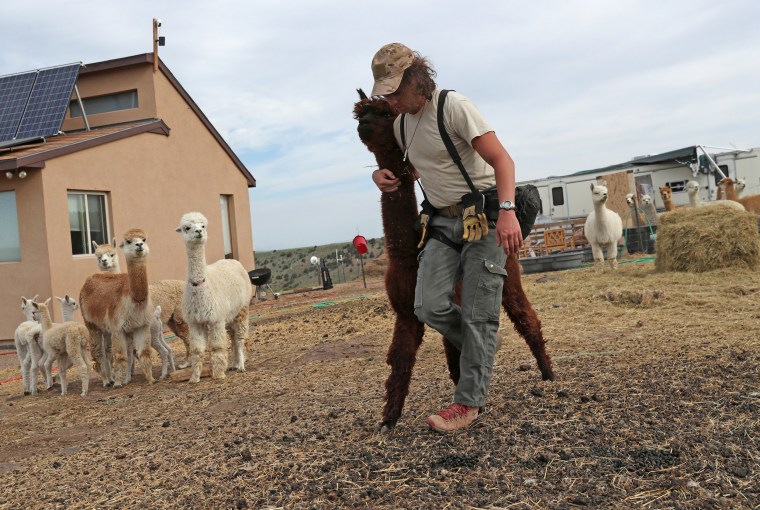
The ranch posted about the incident, which residents now refer to as “the siege” on social media, and Logue said they received support from across the country. A local chapter of the Socialist Rifle Association donated enough armor for all the ranch residents, for example.
Their GoFundMe was also fully funded, raising $100,000. It allowed them to purchase security cameras to take the place of armed guards and a tractor, which they used to put up new fencing.
Ash Kreis, a documentary filmmaker from Colorado Springs, lived at the ranch for nine months and recorded many of the events leading up to, during and after the siege. The trailer for the documentary, called “Tenacious,” debuted last month.
Over the last few weeks, things have calmed down, but Logue said multiple residents developed post-traumatic stress disorder from that time.
“There are lasting effects of that kind of trauma, because it’s 24 hours a day,” said Logue, who added that she experienced PTSD from her time in the military. “It is literally taking a group of people and dropping them into what is a potential combat zone everywhere they go in their home.”
The experience has “hardened” them even more, Logue said, so that if it comes down to it, they will defend themselves if someone comes onto the property with ill intent.
“We’re done. Queer people are done being stepped on,” Logue said. “Whereas nonviolence is a wonderful end goal, that’s not what stage we’re at.”
Nelson added that many marginalized people are arming themselves now, “because they realize we’ve been in an arms race, and we are far behind.”
“The system isn’t going to help us,” Nelson said. “We have to protect us.”
‘A sense of community’
Logue and Nelson decided to send an open invitation for people to come help with shearing from June 23 to 25. They offered up camping space just outside of their dome-shaped Earthship, a type of off-the-grid, solar-powered home.
One volunteer towed their purple tiny house on a trailer from New Mexico. Another towed a small camper, while still others slept in their cars or set up camp in tents facing the Sangre de Cristo mountain range, which is visible from the Earthship’s front porch.
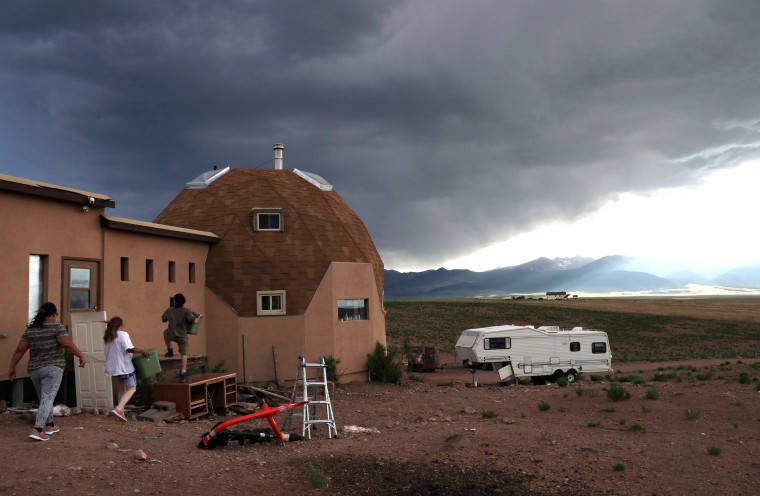
Some of the volunteers were trans people who had recently left their homes permanently. Some wanted to support the ranch after the siege. Others just wanted to see the alpacas and be around other trans people.
Salina Grey, 38, said she found the ranch through social media. She came out as trans in October, and in May, she said she began medical leave from her job as a software architect after her mental health began “spiraling.” She left her home in Mississippi and plans to stay with friends across the country until she finds a place to settle. Visiting the ranch fit into her route “too perfectly to ignore.”
“It’s everything I hoped it would be,” she said of the ranch. Before visiting, she said she constantly questioned whether she was being “feminine enough,” even when she was by herself. But at the ranch, “all the performative expectations are just gone the second you get there, because everybody’s at different stages in their own transition,” she said. “So they get it, and you can just be.”
Most of the volunteers helped with shearing the alpacas. The three-person shearing team and volunteers would shear two alpacas at a time next to each other in the small barn, using a generator to power the clippers.
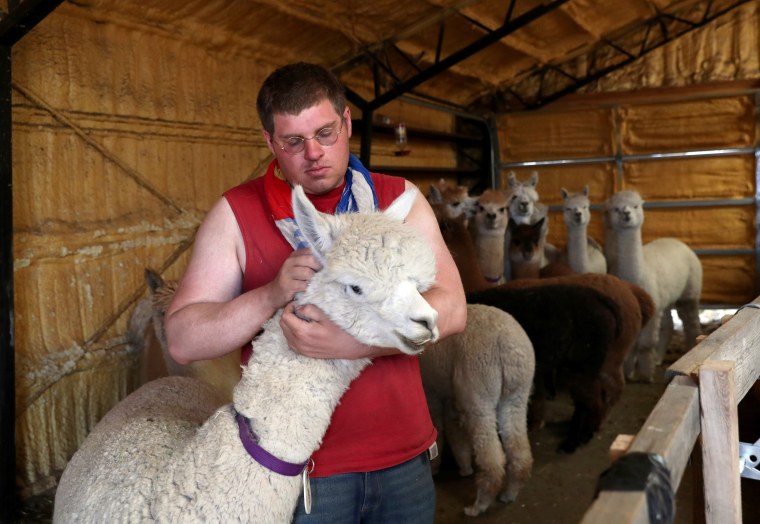
To prevent an alpaca from being nicked by the clippers, their skin has to be as flat as possible, Nelson said, so their front and back feet are tied. Nelson and eir husband, Sky, would wrangle an alpaca from the pen on the other side of the barn and pick them up so volunteers could secure the ties to their feet.
When Tom, the shearer, began clipping an alpaca’s “saddle,” the fiber on its back, it would fall away from the alpaca into a soft blanket, which volunteers would gather in plastic bags. He’d quickly trim their necks and then their bellies and legs, passing the trimmings to volunteers.
Between alpacas, the shearing area was cleaned and two more alpacas were brought in, starting the process all over again.
At one point, after securing a male alpaca, Logue parted some of the thick black-brown fiber in his saddle, which provides the highest-quality fiber. She pointed to the crimp in it, which is desirable because it makes better yarn.
“Good boy!” she said, rubbing the alpaca’s neck.
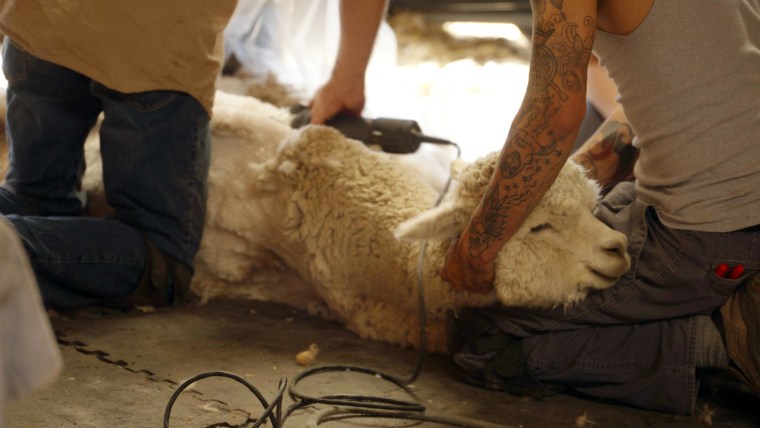
Most of the alpacas were quiet and calm during shearing. Others would make a high-pitched, vibrating trill in protest, and some would spit at volunteers. By the end of each day, most volunteers were covered in a layer of dirt and hair, having helped shear between 50 and 60 alpacas.
One volunteer, Juliette Angotti, drove from Denver on the second day of shearing. As a cisgender person, she said she wanted to support the ranch’s mission because trans people’s lives are “on the line” and the ranch, by providing a safe space for people, saves lives.
She said she loves how shearing requires teamwork. Volunteers would pass their knowledge of shearing down to new volunteers as they showed up, which would repeat throughout the day as new people circulated in and out of the shearing barn.
“I loved it, because it’s therapy, being around the animals,” Angotti said. “I was very impressed by all the workers and everybody on the ranch. It’s hard work.”
The livestock help support the ranch, and they provide some of the residents with daily work that doesn’t require them to enter the traditional job market. According to the 2015 U.S. Transgender Survey, 16 percent of trans respondents who had ever been employed reported losing a job due to their gender identity or expression. Of those who had applied for a job in the previous year, 27 percent reported being fired, denied a promotion or not hired for a job they applied for due to their gender identity or expression.
Daisy Hand, who moved to the ranch in July 2020 from Albuquerque, New Mexico, said she wasn’t suited to “life outside” or “the capitalistic world.”
“I was a functional alcoholic, and I needed the alcohol to function,” Hand, 38, said. “Once I cut that off, then I was no longer able to do anything really. I was depressed for a long time.”
After receiving therapy and coming out as trans, she began following the ranch and Kat Gibes, one of Logue’s two girlfriends, on social media. Though there isn’t any more room in the Earthship, Hand said she was able to move to the ranch because she has her own trailer.
On the ranch, she does chores and cares for one of the newborn alpacas, or crias, after it was rejected by its mother. She also cares for three lambs, which need to be bottle fed every few hours.
Being on the ranch has given her the space to be herself, she said, and “figure out who that is, really.”
“There’s definitely a sense of community here that I never really got out in the world,” she said.
‘We want to save everyone’
The three-day shearing was the largest gathering the ranch has ever had, Gibes said.
Though more press coverage and a growing social media following has opened them up to more harassment, Gibes said it has also made them a destination for queer people. The shearing captured that part of the ranch’s mission.
“Reminding yourself how many of us there are, it’s really good,” she said. “And then when they’re all under one big tent, and they’re all there for the same reason — even if they’re not all helping with shearing, that’s fine, they’re just here for the experience — I live for that.”
The ranch also wants to provide more housing to queer people who need it, but it’s out of space. Logue and Nelson said there’s another property with an additional 40 acres just over the hill from where they currently live that they’re interested in buying, but the new Earthship on it won’t be completed for another two years. In the near future, they hope to expand the sewer system on their current property, which would allow them to house 10 more people.
“It’s been a tough juggling process, because we want to save everyone,” Gibes said.
In addition to expanding their housing, the ranch founders are trying to help other people do what they’re doing. Logue said they’re in talks with an Indigenous group that wants to start its own ranch in Arizona for the Indigenous queer community. Logue said they plan to cosign for that ranch, put a deposit down and give the residents a herd of alpacas to get started.
“Hopefully we can get back some ancestral land, which is really a top priority for us,” she said, referring to land that originally belonged to Indigenous people. “We feel that, as opposed to expanding this location, we really want to stay on mission and get other locations in other states going, because that’s what makes it easier for people to get to these places, is to have at least one in every state.”
A similar project, inspired by the Tenacious Unicorn Ranch, is starting independently in Washington state. Jacey Cronin, who lives in Tacoma, said she and her partner will close on a 5-acre farm in Bellingham, about a two-hour drive north, in August.
“I was really kind of blown away with all they were doing out there,” Cronin said of the Tenacious Unicorn Ranch, which she started following on social media about two years ago. “There’s this group of bold people just kind of doing their thing out in Colorado. I thought that that would be really cool — to have our own little family of queer folks and our own little polycule do something similar.”
She said they plan to have livestock and use permaculture techniques to grow food. She hopes to also provide emergency housing for local queer people or at least a safe place people can visit.
“When you look out into the rural areas, some of them are a bit unfriendly,” she said. “I think the political climate that we’re also in has really polarized a lot of folks, so having our own space of like-minded people, that creates a safe space for us to live in.”
Nelson and Logue said the community response to the ranch is what drives them to want to expand.
“At the end of the day, if it was up to me and Bonnie, we’re pretty private people,” Logue said. “We love what we’re doing up here, but we don’t want 30 people here all the time. But that is what the community needs. We respond to what the community asks of us.”
Nelson quickly added, “We pull the sails and steer as best we can.”
“But the community’s the wind,” Logue said.
CORRECTION (July 18, 2021, 4:16 p.m. ET): A previous version of this article misspelled the last names of one of the volunteers and one of the ranch residents. The volunteer is Salina Grey, not Gray. The ranch resident is Kat Gibes, not Gibbs.
